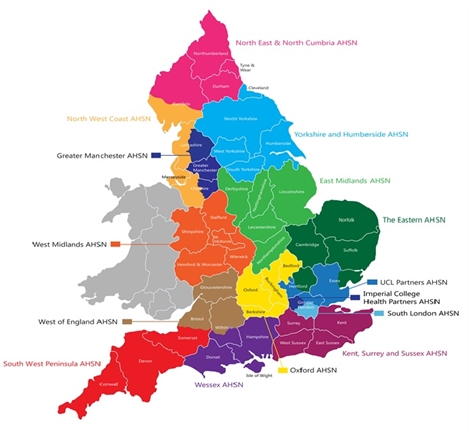14.11.14
Making safety everyone’s business
Source: National Health Executive Nov/Dec 2014
Steve Fairman, managing director at NHS Improving Quality, talks about the launch of 15 Patient Safety Collaboratives and what he hopes these will achieve. Dr Liz Mear, chief executive at the North West Coast AHSN, also discusses what role her organisation will play in delivering continual patient safety learning. David Stevenson reports.
A new national programme has been launched to ensure continual patient safety learning sits at the heart of healthcare in England.
Each of the 15 Academic Health Science Networks (AHSNs) is leading a Patient Safety Collaborative to tackle the leading causes of avoidable harm to patients, as part of a scheme coordinated by NHS Improving Quality (IQ) and NHS England.
Steve Fairman, managing director of NHS IQ, told NHE: “This is the first time the NHS has had a strategic, locally-grounded approach to safety.
“This single approach, led at a local level by the AHSNs – with input and learning from universities, industrial partners and councils, the third sector and the health service – will be massively important.”
The programme was borne out of Professor Don Berwick’s 2013 report ‘A Promise to Learn – a commitment to act: improving the safety of patients in England’.
Prof Berwick’s study called for the NHS “to become, more than ever before, a system devoted to continual learning and improvement of patient care, top to bottom and end to end”.
Fairman added that the initiative is about building capability and a safety culture within every NHS organisation.
He gave us an example based on something he’d seen recently at the Yorkshire & Humber AHSN. “They are looking at reducing the number of falls in local hospitals, and have got a small team working with staff in individual wards in individual hospitals. They have meetings every morning called ‘safety clusters’ to talk about what fall or near-fall incidents have occurred, and what they can do to prevent them.
“A constant learning experience is building. That is the beauty of these locally-driven initiatives: they can get out into individual hospitals and wards and build the capability of the front-line, patient-facing staff.”
All the AHSNs are putting a major emphasis on developing high-quality leadership in improving safety. Prof Berwick’s report found that the current culture doesn’t always encourage staff to come forward when they feel their area of work is unsafe, or potentially unsafe, noted Fairman. He added: “Leadership is about giving people permission and space to do this and about setting an example of what safe care and leadership looks like.”
Dr Liz Mear, chief executive of the North West Coast AHSN, told us that because the science networks already have partners in health, technology, business and universities for trialling and research, the latest approach brings a wider scope to the table than what has gone before.
“We already have the partnerships set up, so we’re not performance management organisations – we’re supportive partners helping to put things into practice.
“Obviously you’re influencing through the networks you’ve built up and the good relationships and putting people together who could have complimentary partnerships.
“It is unique because it isn’t forced on you: the AHSNs have the ‘menu of choice’ to choose from with regards to areas of focus. Obviously there has to be robust measurement strategies around these to show that you are delivering change, but you’re not constrained by feeling hemmed in and forced to take one line of action.”
Setting priorities
Each Collaborative sets its own priority safety areas, such as reducing pressure ulcers, falls or medical device errors, to ensure they have the biggest impact in meeting local need.
They will also help support individuals, teams and organisations to build skills and knowledge about safety improvement and provide opportunities to continually learn from each other.
“For instance, in Yorkshire & Humber AHSN there is a big focus on reducing falls in hospitals, in Greater Manchester AHSN there is a focus on medicine safety, in other areas there will be a focus on reducing pressure ulcers, and that is why these are so important and locally-led,” said Fairman. “This is a real way in which these local priorities can be influenced.”

In the north west, Dr Mear noted that from the ‘menu of choice’ options the Collaborative partners sat down and worked through what, as a region, they thought were the most important issues based on what they knew about the area.
“For example, one of our big programmes will be optimising medicines,” she said. “We are looking at electronic software that monitors what medicines are being prescribed, but also how we train staff on the frontline to administer as well to make sure they don’t make errors.
“We’re also working with a company called Proteus, which has developed an ingestible sensor tablet. So, when a patient takes their medication they also take a benign tablet with a little sensor in it and that can let the carer and doctor, via a patch you put on your stomach, know that you are taking the right medicine at the right time or not – so it can be adjusted accordingly.”
Measurement
With regards to measuring safety and improvements, Dr Mear stated that any changes need to be measured over time. And, initially, the AHSNs need to set baselines in their areas of focus. She noted that some people already have these in place whereas others, like the North West Coast AHSN, have commissioned work to establish the baseline.
“For us, on the medicines optimisation, we want to cut medication errors and we can get a baseline about errors now and how we want to increase compliance of service users taking their medication and of providers in the future,” said Dr Mear. “We commissioned an organisation called Haelo in the north west, and their speciality is measurement of health-related outcomes, to help find the baseline. Once this is established, our work will be about trying to proactively prevent harm from happening.”
Supporting role
NHS IQ and NHS England will provide a ‘supporting’ role to the Collaboratives and AHSNs, helping in some of the more technical issues such as measuring improvement in safety or helping to share the learning and good practice developed by each AHSN.
Fairman called this a very “hands-off” national programme compared to many that have gone before.
“We’re not there to get in the way,” he noted. “As part of our work, though, we’re going to try to bring together the local results into a national picture, so that Jeremy Hunt and other ministers have a coherent picture of what is happening on safety rather than having 15 regional pictures.”
The Collaboratives will be funded by NHS England at £12m a year for the next five years. However, only £5.17m was allocated for 2014-15 across the AHSNs as partial year funding.
Discussing the funding, Dr Mear said that money will be spent on developing leadership and training staff on the frontline.
“There is other spend about bringing groups of people together,” she added. “For example, if you have a lot of medical optimisation professionals and you want them to share good practice and learn from each other you need a coordinating role pulling them together and helping them to understand how to do this in practice.
“There is also the cost in setting up the baseline measurements, and oversight of the programme is quite a big task. We have come a long way in the last few years with regards to patient safety, but how can we make it even safer.”
On top of this, the 15 AHSNs work very closely meeting on a bi-monthly basis to share good practice and lessons learned. But Dr Mear noted that because of the ‘menu of choice’ some AHSNs will be focusing on the same areas. In order to coordinate this activity nationally NHS IQ will pull together cluster groups around the choices. For instance, those looking at acute kidney injury will meet to look at who is doing what, how they measure and benchmark against each other and how to share best practice.
Sign up to Safety
The programme also supports the aim of the ‘Sign up to Safety’ campaign to make the NHS the safest healthcare system in the world by creating a system devoted to continuous learning and improvement. Fairman added: “The Collaboratives and Sign up to Safety are seamlessly joined at the top, but locally what will happen is that with the Sign up to Safety campaign, each individual organisation is being asked to sign up to two national and two local priority areas. What will then happen, effectively, is that they will sign up to areas that are being covered in their local safety Collaboratives. They will be very closely joined and they will support each other to enhance the value of each.”

The 15 AHSNs
- East Midlands
- Eastern
- Greater Manchester
- North East and North Cumbria
- North West Coast
- Imperial College Health Partners
- Oxford
- South London
- South West Peninsula
- Kent, Surrey and Sussex
- UCL Partners
- Wessex
- West Midlands
- West of England
- Yorkshire and Humber
Tell us what you think – have your say below or email [email protected]